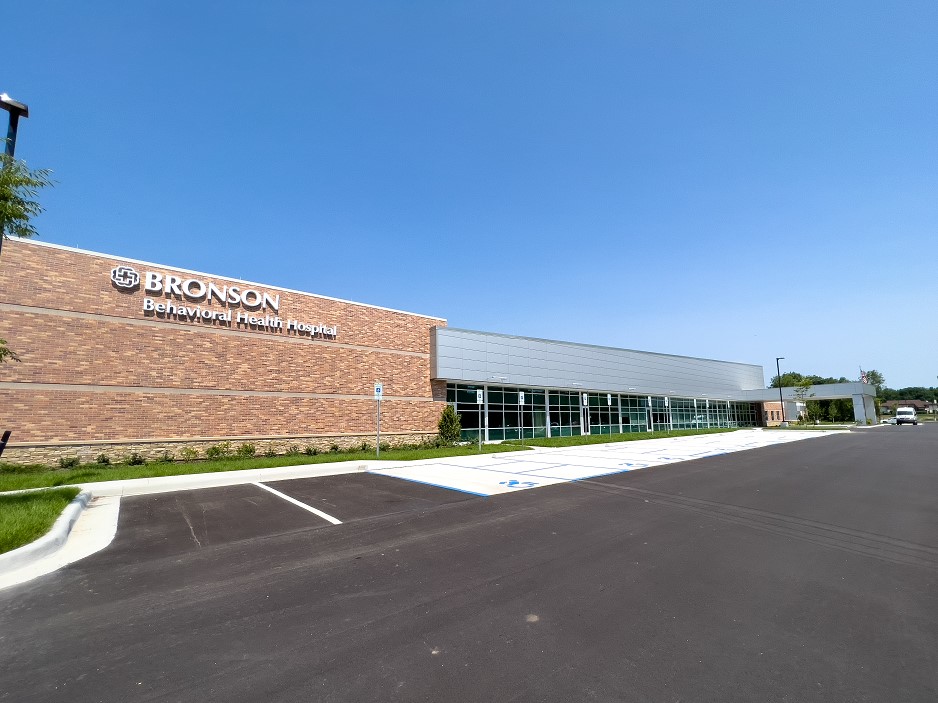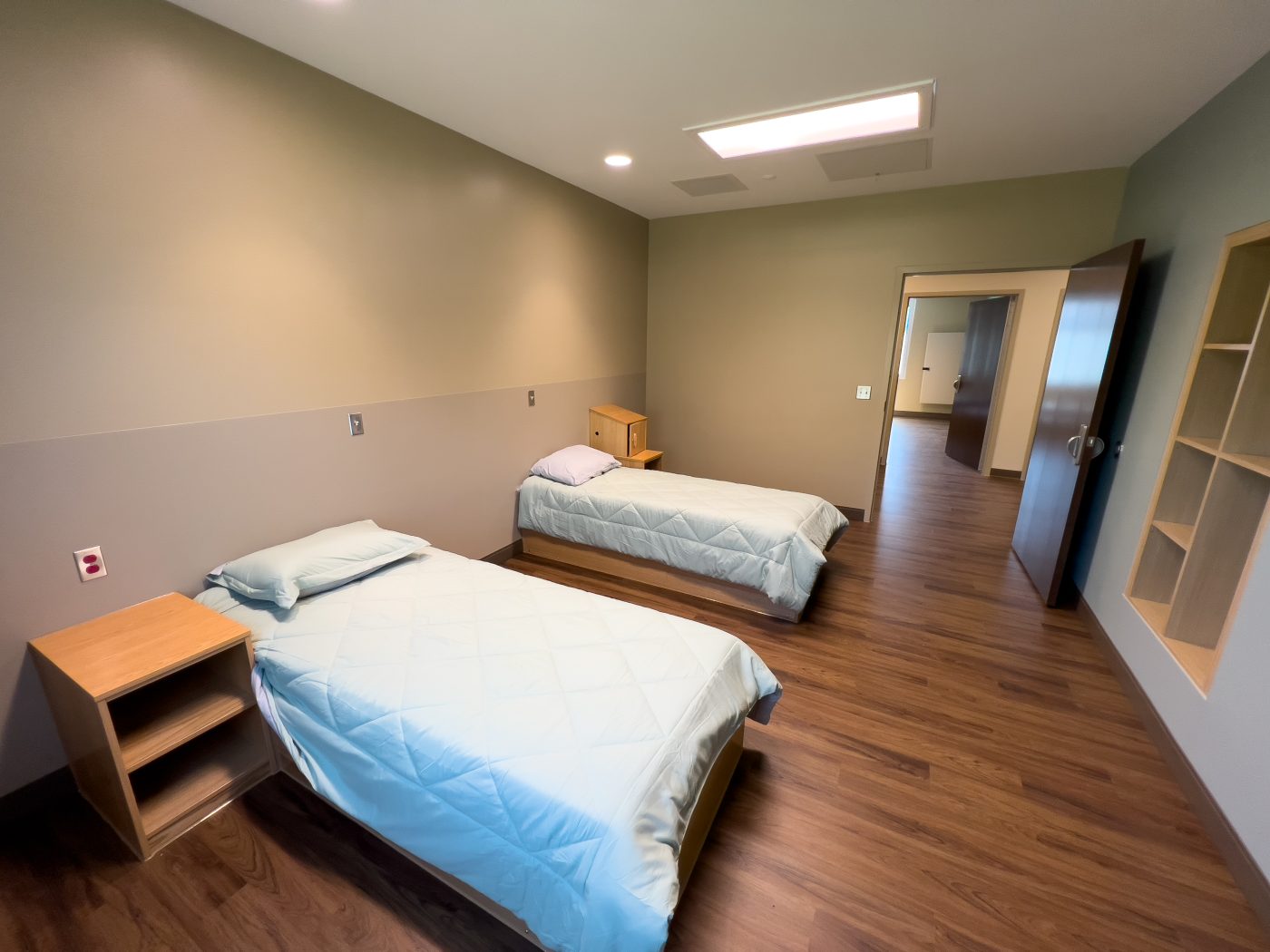Opioid addiction is defined as the urge to continue using opioids even when this use has negative consequences. Using illicit opioids such as heroin or misusing legal opioids like prescription painkillers can put you at risk for developing an opioid addiction.
Opioid abuse can lead to strained relationships, trouble keeping a job, physical disabilities, and overdose. Opioids can be difficult to quit using because of how quickly the brain adjusts to them, causing intense cravings. Even though opioid addiction can be challenging to overcome, it is possible. Professional treatment can help you manage withdrawal symptoms and learn new coping skills that can support lifelong healing.
At Bronson Behavioral Health Hospital in Battle Creek, Michigan, we treat adults who have a primary mental health disorder. If our patients also have an opioid addiction, we treat it as a co-occurring concern. The staff at our inpatient opioid addiction treatment center addresses patients’ symptoms together to ensure the best overall treatment outcomes.
Signs & Symptoms of Opioid Addiction
Sourcing illicit drugs on the street or taking prescription painkillers in higher doses or for a longer time than prescribed can lead to opioid use disorder.
Signs that you or someone you love has an opioid addiction may include:
- Intense cravings for opioids
- Failing to meet responsibilities at home or work because of opioid abuse
- Requiring larger doses of opioids to achieve the same desired effects
- Spending significant amounts of time finding, using, and recovering from the use of opioids
- Developing distressing withdrawal symptoms when unable to use opioids or when attempting to quit using them
- Failing to decrease the frequency and quantity of opioid use despite attempts to do so
- Abandoning activities or interests that were once meaningful
- Using opioids to experience pleasure or cope with feelings of sadness
- Concealing injection sites by wearing long sleeves and pants even in hot weather
Potential physical symptoms of opioid use include:
- Slowed digestive system, leading to persistent constipation
- Depressed central nervous system, causing drowsiness, excessive sleepiness, or sedation
- Constricted pupils
- Nodding off or falling asleep unexpectedly, even in inappropriate situations
- Impaired motor functions, leading to slurred or slow speech patterns
- Itchy or flushed skin
- Needle marks or track marks
- Suppressed appetite and weight loss
- Poor coordination
- Respiratory depression
If you or a loved one is experiencing any of these symptoms, please reach out to a mental health professional who can help you begin healing. Our staff at Bronson Behavioral Health can answer any questions you have about our opioid addiction treatment plans.
Common Causes of & Risk Factors for Opioid Addiction
Opioid addiction is influenced by a combination of genetic, environmental, and psychological factors. Common causes of and risk factors for opioid addiction include:
- Genetics: Genetic factors can contribute to a person’s tendency to develop an addiction.
- Biology: Opioids interact with the brain’s reward system and can produce feelings of euphoria and relaxation. Over time, repeated opioid use can lead to changes in brain chemistry and function, making people more likely to develop an addiction.
- Pain management: Prolonged use of prescription opioids for pain relief can increase the risk for developing an addiction.
- Environmental factors: Factors such as easy access to opioids, peer influence, and exposure to trauma or stress can lead to opioid addiction.
- Previous substance use: People who have a history of substance abuse are at a higher risk for developing an opioid addiction.
- Mental health conditions: Co-occurring mental health disorders, such as depression, anxiety, and posttraumatic stress disorder (PTSD), can increase the likelihood of opioid abuse.
- Social and economic factors: Poverty, unemployment, unstable living conditions, and lack of healthcare access can create a higher-risk environment for opioid use disorder.
- Peer influence: The influence of friends, family members, and social circles that encourage or engage in opioid use can increase the likelihood of developing addiction.
Understanding the causes of and risk factors for opioid use disorder can help mental health professionals gain insight into your symptoms. By receiving care at the right inpatient treatment place, you can learn to manage your symptoms and lead a happy and fulfilling life.
Opioid Addiction Statistics
The World Health Organization reports the following statistics on worldwide opioid use:
- Approximately 500,000 deaths are caused by drug use, and more than 70% of those deaths are related to opioids.
- Around 62 million people used opioids in 2019.
- Most people who are dependent on opioids use heroin, but the number of people who abuse prescription opioids increases daily.
Opioid addiction also continues to spread in the United States, with increasing fatality rates. Based on studies from 2020, the Centers for Disease Control and Prevention (CDC) shared the following opioid overdose statistics:
- Opioid overdoses caused the deaths of nearly 69,000 people in 2020.
- Approximately 75% of drug overdose deaths in 2020 involved opioids.
- Overdose deaths caused by opioids have increased by more than eight times since 1999.
- More than 82% of opioid overdose deaths involved synthetic opioids.
Effects of Untreated Opioid Addiction
Opioid addiction can have a wide range of effects on many aspects of a person’s life. These effects can be physical, psychological, or social.
Potential physical health effects of opioid abuse include:
- Increased tolerance
- Withdrawal symptoms
- Respiratory depression, oxygen deprivation, and overdose
- Increased risk for infectious diseases
Common psychological and emotional effects of opioid addiction include:
- Lowered cognitive function affecting memory, attention, and decision-making
- Co-occurring mental health concerns such as depression, anxiety, and personality disorders
- Mood swings, irritability, and heightened emotional sensitivity
- Impaired judgment and decision-making
Social and interpersonal effects of opioid use disorder can include:
- Strained relationships
- Isolation and withdrawal
- Legal and financial problems
With appropriate treatment, support, and interventions, people who are struggling with opioid use disorder can heal and improve their overall well-being. A mental health professional can offer life-changing treatment that helps people manage their symptoms and avoid the devastating effects of opioid addiction.
Symptoms of Opioid Withdrawal
Opioid withdrawal symptoms can vary in severity and duration depending on factors such as the type of opioid used, the duration and intensity of use, and the person’s age and overall health. Withdrawal occurs when a person who is accustomed to using opioids reduces or stops their opioid use. Common opioid withdrawal symptoms include:
- Flulike symptoms such as a runny nose, watery eyes, sneezing, and chills
- Yawning
- Muscle aches and pains
- Sweating
- Gastrointestinal problems such as nausea, vomiting, diarrhea, and stomach cramps
- Loss of appetite
- Anxiety
- Restlessness
- Irritability
- Insomnia or disturbed sleep patterns
- Depression
- Mood swings
- Rapid heartbeat
- Increased blood pressure
- Dilated pupils
- Tremors or shaking
- Intense cravings for opioids
Opioid withdrawal symptoms can be uncomfortable and distressing but are not typically life-threatening. However, sudden discontinuation of certain opioids that have a shorter half-life, like fentanyl and heroin, can lead to more severe and potentially dangerous withdrawal symptoms. Getting professional treatment can help you manage withdrawal so that you can continue to heal.
The severity and duration of withdrawal symptoms can vary widely from person to person. Some people may experience mild symptoms that last for a few days, while others may have more prolonged and intense withdrawal symptoms that persist for several weeks. It’s highly recommended that you get professional behavioral health support during the withdrawal process to ensure that you manage your symptoms safely and effectively.
Therapies We Use To Treat Co-Occurring Opioid Addiction
At Bronson Behavioral Health, inpatient treatment for co-occurring opioid addiction includes a structured schedule of therapy and meetings with a variety of mental health professionals. We specialize in providing co-occurring opioid addiction treatment for adults who are experiencing disruptive symptoms. Our clinically excellent care can include the following evidence-based therapies:
- Cognitive behavioral therapy (CBT): CBT is a widely used therapeutic approach that helps patients identify and change negative thoughts, beliefs, and behaviors associated with addiction. It focuses on developing coping strategies, improving problem-solving skills, and preventing relapse. At Bronson, licensed counselors may use CBT in an individual or group therapy setting.
- Group therapy: In group therapy sessions, patients can come together to share their experiences, provide support, and learn from each other. These sessions can encourage a sense of community, reduce feelings of isolation, and provide valuable insights and coping strategies. Patients who are receiving opioid addiction treatment at Bronson Behavioral Health can attend daily group therapy.
- Family therapy: Family therapy aims to improve family dynamics, address communication issues, educate loved ones about addiction, and help establish a supportive home environment for recovery. We offer family therapy depending on the patient’s needs.
Based on your goals, our mental health professionals will create a personalized treatment plan that combines appropriate services and therapies. Our inpatient staff simultaneously addresses primary mental health disorders and co-occurring opioid addictions for the best outcomes.
Why Choose Our Co-Occurring Opioid Addiction Treatment Center
At Bronson Behavioral Health Hospital, adults age 18 and older can receive excellent treatment for co-occurring opioid addiction. Our new facility is designed to provide a safe and supportive environment where you can receive clinically excellent care and compassionate support.
We know that it takes courage to receive opioid addiction treatment, and we aim to help you form a foundation for ongoing healing during your stay with us and after you leave. Inpatient treatment for opioid addiction can offer many benefits and features, such as:
- Medication management: You can see a psychiatrist daily, and a certified registered nurse practitioner or physician assistant can also help monitor your medication.
- Evidence-based therapy: At Bronson, you can receive individual and family therapy as needed along with daily group therapy with certified mental health professionals.
- Multidisciplinary team of experts: Bronson Behavioral Health features a superior team of experts from multiple disciplines, including psychiatrists, counselors, social workers, registered nurses, general practitioners, physician assistants, and dietitians.
- Safety and security: Our new facility has technological features that can ensure your safety and comfort.
- Focused care: Our behavioral health staff can consistently and compassionately attend to your needs as you heal.
Bronson Behavioral Health Hospital’s inpatient treatment facility allows you to focus your attention on your mental health. You can receive excellent care at our opioid addiction treatment center that can help you thrive. Please contact our staff if you have any questions about whether inpatient opioid addiction treatment is right for you or your loved one.
This content was written on behalf of and reviewed by the clinical staff at Bronson Behavioral Health Hospital.






